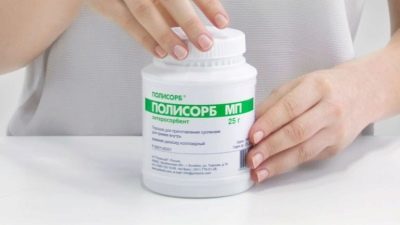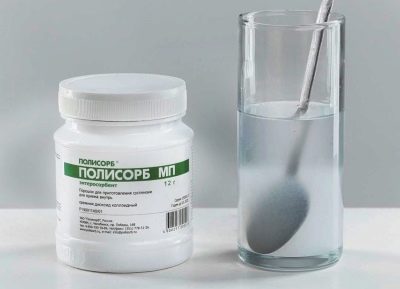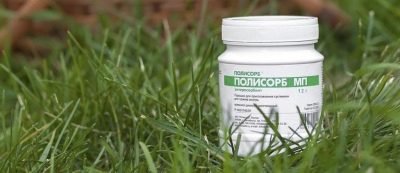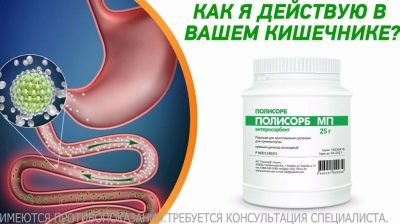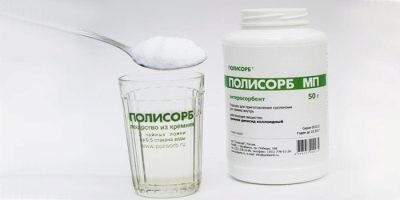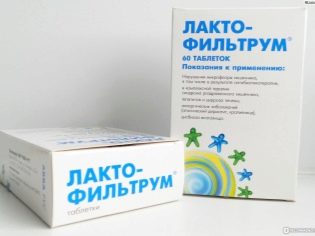"Polysorb" during pregnancy: instructions for use
When a woman waits for a baby, it is undesirable to take any medication. However, during the carrying of the infant, there are various health problems, such as nausea after eating stale food, a viral infection, inflammation of the kidneys, an allergic reaction or poisoning. In all these cases, the future mother may be assigned a "Polysorb".
Such a drug from the group of sorbents is capable of binding various toxins and harmful microorganisms. It is safe for the fetus and newborn drugs, so it is widely used both during pregnancy and breastfeeding.
Features of the drug
The main ingredient of Polysorb is colloidal silicon dioxide. This inorganic compound is the only component, since there are no other substances in the composition of the preparation. Dyes, preservatives, perfumes and other chemical compounds in this medication are missing.
The medicine itself is released in only one form. It is an amorphous powder without any smell, which has a white or white-bluish color. Before use, water is added to it to form a suspension. "Polysorb" is sold in plastic jars containing from 12 to 50 g of powder, as well as in sachets. This portion of the form includes 3 g of active ingredient.
It is not required to present a prescription from the doctor for the purchase of medication at a pharmacy.
The average price of a jar with 12 g of powder is 200 rubles, and a box of 10 sachets costs about 600 rubles. It is possible to store the drug at home undiluted or sealed at room temperature for the entire shelf life of 5 years. After dilution with liquid, the agent should be taken within 48 hours, but it is best to prepare a fresh solution for each application.
Note that in the name of the medicine there are usually two large letters "MP", but in everyday life they are often not mentioned. Therefore, when it comes to “Polysorb”, a drug called “Polysorb MP” is always meant. This is important to remember, so as not to confuse it with the medication used by veterinarians (in its name there are letters "VP").
How does it work?
The drug has a strong sorption effect, due to which “Polysorb”, after entering the intestine, is able to absorb much more harmful compounds compared to lignins, aluminosilicates or activated carbon. That is why it is very popular not only for poisoning, but also for allergies, ARVI and other diseases.
The powder has no selectivity, that is, it absorbs a wide variety of substances, including:
- pathogenic microbes;
- allergens in food;
- toxic substances;
- ethanol;
- medications;
- gaseous substances;
- viruses;
- toxins produced by bacteria;
- fungus;
- radionuclides;
- excess cholesterol, creatinine, urea;
- biological substances formed during infectious diseases;
- heavy metal salts.
Is it allowed during pregnancy?
The active compound of the drug is unable to be absorbed through the intestinal walls, therefore it does not enter the blood and does not change in the body.It, having absorbed all exogenous and endogenous harmful substances, leaves the digestive tract unchanged. For this reason, Polysorb is unable to have a negative impact on the development of crumbs in the tummy and on the condition of the uterus during gestation.
This allows you to use this sorbent not only in 2 and 3 trimesters, when the action of many drugs does not harm the child, but also in 1 trimester, when the baby’s organs are only laid down and any outside influence can provoke developmental defects.
A future mother can take Polysorb if she has a fever, nausea, diarrhea, vomiting, headache or other symptoms of intoxication. The drug helps to alleviate the condition in case of toxicosis, which often worries women in the early stages, so this is one of the main reasons for the appointment of "Polysorb" while waiting for a child. It is also indicated for intestinal infections, regardless of their cause, as well as for poisoning with spoiled products.
Many future mothers take "Polysorb" and with such problems:
- SARS, flu or cold;
- dysbacteriosis;
- purulent infections;
- burns;
- poisoning with heavy metals and other poisons;
- food allergies;
- drug overdose;
- hepatitis;
- hemolytic anemia;
- eczema, psoriasis and other skin diseases;
- impaired kidney function.
Sometimes you can find recommendations to take Polysorb for heartburn, but this enterosorbent is unable to get rid of such a painful symptom that often troubles future moms in recent months. If you need to eliminate heartburn, the doctor will select another drug that will cope with this problem.
Can it hurt?
Although "Polysorb" and refer to harmless drugs that can be used even in nursing babies, There are still some contraindications for using such a powder.
- Intolerance, which, although occasionally, but occurs and may appear rash, discomfort in the stomach and other symptoms.
- Such an enterosorbent cannot be taken in case of a peptic ulcer, especially if it was complicated by bleeding.
- One more contraindication to treatment with Polysorb is intestinal atony.
Among the side effects of the drug are possible allergic reactions, with the appearance of which the admission is immediately canceled.
Some expectant mothers complain of the development of constipation, which can also occur if you exceed the dose. therefore with a tendency to constipation from the use of this sorbent is better to refuse. Other side effects after taking Polysorb are usually not observed. No cases of powder overdose have been reported yet.
Another harm from "Polysorb" is possible if the expectant mother takes some other medicine. It is about the deterioration of their absorption under the action of silicon dioxide, which will affect the effectiveness of treatment. To eliminate this problem, Between the use of "Polysorb" and taking other drugs recommend waiting for 1-1.5 hours. The same interval is recommended for meals, so that all the useful elements from foodstuffs are normally absorbed in the body (if you drink Polysorb while eating, it can interfere with this).
How to use?
Polysorb should be taken internally, making a therapeutic suspension of powder. To do this, the drug is combined with ordinary water or other drink. After stirring the medicine, they immediately drink it. This is usually done between meals, but in the case of food allergies, the diluted medication is drunk with food.
The dosage of the drug is chosen individually, so a pregnant woman is better not to drink it yourself, but first consult with your doctor.
Per 1 kg of weight, 0.1-0.33 g of powder is used - this daily dosage, on average 6-12 grams, is divided into 3-4 times.
Most often at one time use 1-2 tablespoons of powder, which is stirred in 100-150 ml of liquid.When dosing, it is necessary to take into account that about 3 grams of active compound can be placed in one tablespoon, and a teaspoon recruited from the “hill” contains about 1 gram of medicine.
If the expectant mother has a burn or festering skin, the powder can be applied externally. For acne and acne, masks are also often used.
The duration of the use of "Polysorb" is determined by both the disease and the woman's well-being. Usually, in case of food poisoning, intestinal infection or ARVI, it is enough to drink medicine for a few days. In case of such diseases, it is recommended to take another 2-3 days after normalization of the patient's condition. If the sorbent is discharged with an increased level of bilirubin due to active hepatitis, the course of treatment lasts 7-10 days, and renal failure requires a longer treatment (20-30 days or longer).
In case of an allergic reaction, the drug is drunk until the negative symptoms have completely disappeared. but taking Polysorb for longer than 2 weeks is not recommended., because it will affect the absorption of various nutrients, such as calcium or vitamins.
If the expectant mother is prescribed a long-term use of this sorbent, then the doctor will definitely prescribe additional vitamin preparations.
Reviews
Polysorb treatment during pregnancy mostly responds well. Women confirm its effectiveness in intoxication, diarrhea, allergic rash and other problems. Many pregnant women noted the positive impact of "Polysorb" in early toxicosis.. According to them, the drug helped to get rid of vomiting and morning sickness, reduced the severity of unpleasant sensations due to strong odors or eating certain foods.
Moreover, among the disadvantages of such a tool is usually called its unpleasant taste, as diluted "Polysorb" is a suspension. Side effects of this medication are rarely noted, but some expectant mothers complained of constipation.
Analogs
To replace the "Polysorb" during childbirth the doctor may recommend Enterosgel. Such gel paste, which is produced in bags and tubes, contains a silicon-organic base. It is able to adsorb toxins, toxic substances, allergens, harmful bacteria and other compounds. It is permissible to apply both in the first months of pregnancy and in the later periods.
Another effective analogue of "Polysorb" can be called «Smektu». The effect of this drug is due to smectite, which is also the main ingredient of Diosmectite and Neosmectin. All these drugs are allowed for any period of gestation, safe for the fetus and are available in portion packs. They help with diarrhea, vomiting, heartburn, flatulence and other unpleasant symptoms from the gastrointestinal tract.
Replace "Polysorb" can and pills "Laktofiltrum". Their main difference is the presence of two active compounds at once. One of them (lignin) absorbs allergens, poisons and bacteria, the second (lactulose) helps the development of beneficial microflora. The tool is safe for future mothers, often prescribed to patients with rotavirus, giardiasis, dermatitis, liver inflammation, dysbacteriosis and many other pathologies.
Instructions for use "Polysorb", see the following video.

